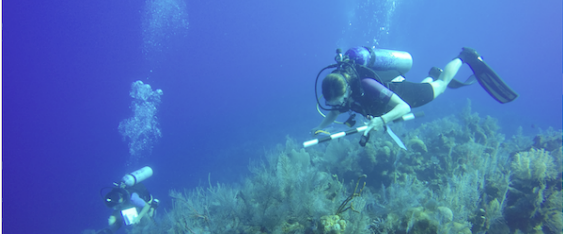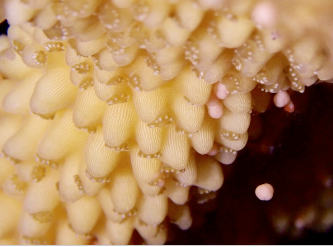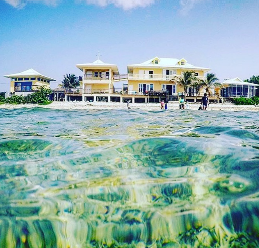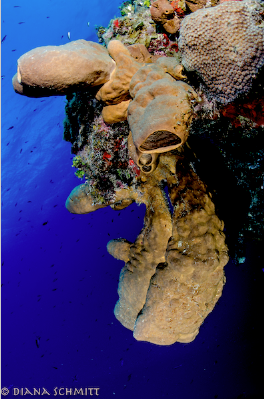Little Cayman offers hope for coral reefs

George Town, Cayman Islands; 6 June 2020 – Little Cayman has successfully been championed to become a Mission Blue (Sylvia Earle Alliance) “Hope Spot” by the Central Caribbean Marine Institute (CCMI) as part of their World Oceans Day celebrations. The Hope Spot initiative was launched in 2009, and it now includes some of the world’s most precious ecosystems:
“Hope Spots are special places that are critical to the health of the ocean — Earth’s blue heart. Hope Spots are about recognizing, empowering and supporting individuals and communities around the world in their efforts to protect the ocean.”
Little Cayman is being recognized as a Hope Spot because of the high abundance of threatened and endemic species found there. Just off the western point of Little Cayman is a site protected by the Cayman Islands Government that is one of the last remaining large spawning aggregation sites for the endangered Nassau grouper. Green, hawksbill and loggerhead sea turtles nest in the hundreds on Little Cayman’s beaches every year, and the coast is abundant with marine life, including seven species of sharks.
Little Cayman’s coral reefs are also a vibrant contributor to the Island’s rich biodiversity. CCMI’s resilience, restoration and assisted evolution research efforts examine the features that enable corals to persist through time, despite changing conditions. This includes working with staghorn (Acropora cervicornis) and elkhorn coral (Acropora palmata), both of which are critically endangered following a disease outbreak and die-off in the 1980s. These coral species are crucial reef-builders that used to be prevalent throughout the Caribbean, and they are extremely important to the resiliency of healthy coral reefs. Little Cayman’s biodiversity both on land and in the ocean are significant, and CCMI’s scientific discoveries continue to grow our knowledge of these key ecosystems.
Little Cayman is also supported by impactful organisations that seek to identify a more sustainable future, including the Cayman Islands Department of Environment, the Cayman Islands National Trust, the Sister Islands Tourism Association (SITA), the Grouper Moon Project and a host of engaged patrons and stakeholders who reside on Little Cayman. Conservation legislation of ecologically important species developed by the Cayman Islands Government, such as the early adoption of Marine Park Areas (MPAs), no dive zones and specific species protection policies, has also played a crucial role in protecting biodiversity locally.
Dr Carrie Manfrino, CCMI’s founder and president, identified the positivity regarding Little Cayman’s unique reef health when she set up the organisation in 1998. “The reefs of Little Cayman are indicating resilience, and we know healthy reefs lead to healthy lives. Since 1999, the scientific team at CCMI has completed field expeditions using the Atlantic & Gulf Rapid Reef Assessment (AGRRA) protocol to get a snapshot of the status of the reefs in the region. Our results indicate that whilst Little Cayman reefs are not immune to the impacts of local and global change, they have remained stable over time and appear to be more resilient than other Caribbean coral reef systems.”
Survey results from CCMI’s 1999-2019 AGGRA provide a glimmer of hope on an otherwise stormy outlook for coral reefs across the globe. What does a Hope Spot and empirical evidence of a stable coral reef ecosystem really mean? Simply put, Little Cayman is a unique island that indicates coral reefs, and therefore the ocean, can be resilient. Resilience is the key to adapting to changing climate, enabling us to understand how to sustain reefs systems for the future. Little Cayman’s reefs therefore create real hope for the future.
Dr Manfrino has a clear message for everyone this World Oceans Day. “By protecting the ocean today, we are protecting the future of humanity. We can stop the ocean crisis by making a commitment to more sustainable lifestyles. Make that commitment this 2020 World Oceans Day – to reduce your impact on the ocean, whether you are a business, a tourist, or stakeholder. Recognize the changes that you have made and make them everlasting.”
CCMI invites the public to join CCMI’s virtual World Oceans Day celebrations this year, a part of their “We Need Healthy Reefs” campaign, which includes the launch of the Little Cayman Hope Spot, an underwater photography exhibition and auction, and underwater photography webinars (free to participate; registration is required). A full schedule of World Oceans Day events can be found at https://reefresearch.org/get-involved/events-outreach/world-oceans-day/. CCMI shares the results from their monitoring work with the public via our Healthy Reefs outreach campaigns to improve knowledge and ocean stewardship, which can also be found here: https://reefresearch.org/what-we-do/research/healthy-reefs/


2. Key Findings from the CCMI 2019 Healthy Reef Report
Since 1999, the scientific team at CCMI has completed field expeditions using the Atlantic & Gulf Rapid Reef Assessment (AGRRA) protocol to get an annual snapshot of the status of the reefs in the region. Analysis of the trends in AGGRA results since 1999 are as follows:
~ There has been a gradual decline in coral cover in Little Cayman over the last 20 years, going from circa 24% to 20% coral cover. However, this change is not statistically significant. The slow rate of decline indicates that the reefs of Little Cayman are more resilient than reefs in other parts of the Caribbean where declines were rapid and reefs have not rebounded from global events.
~ An overall coral cover of 20% is classified as “good” in terms of reef health. Over time, the health state in Little Cayman has fluctuated with an increasing number of sites classified as “poor” and fewer sites classified as “very good”. However, in 2019, none of the surveyed sites were “poor”, and the majority were either “good” or “good +”, indicating a relatively healthy reef system overall.
~ Our results show that the composition of the coral community on the reef has changed over time, from reefs dominated by massive boulder corals, such as Orbicella annularis, to smaller corals such as Agaricia and Porites.
~ Similar to coral cover, there was a gradual decline in algal cover over the 20 years, but this difference was not significant. The continued stability of algal cover, again indicates a healthy reef that has not yet undergone a phase shift from coral to algae.
~ In terms of fish communities, we found no significant trend in density or biomass. Relative to 2018, however, fish biomass and density was significantly higher in 2019.
~ We found a significant trend of increasing density of parrotfish over the 20 years. Importantly, parrotfish density was found to positively correlate with coral cover, indicating that sites with high densities of parrotfishes have higher percent coral cover. Likewise, overall algal cover was found to negatively correlate with overall herbivore density, meaning that sites with higher densities of herbivorous fishes maintained lower percent cover of macro algae.
~ Results from 21 years of AGGRA therefore indicate that whilst Little Cayman reefs are not immune to the impacts of local and global change, they have remained stable over time and appear to be more resilient than other Caribbean coral reef systems.


3. ABOUT CCMI
CCMI is a US 501(c)(3) not-for-profit, a UK registered charity, and a Cayman Islands registered charity, founded in 1998 to protect the future of coral reefs.
CCMI envisions a world with vibrant oceans and healthy coral reef ecosystems. We seek to be the Caribbean’s premier marine research institute by delivering cutting edge research, transforming conservation strategy and developing education programmes of excellence – discovering and promoting real solutions to declining ocean health.
Our plan is to invigorate key species and understand key ocean processes that drive reef resilience. We support early career scientists who are INNOVATING ways to improve coral reef health. We are TRANSFORMING conservation strategy and work to inspire the CHANGE that is needed to achieve our mission. CCMI are PIONEERS in the region working to reverse the declines of coral reefs.
Contact: [email protected]
Website: www.reefresearch.org
Facebook:https://www.facebook.com/reefresearch
Instagram: https://www.instagram.com/reefresearch/
Scientific papers:https://reefresearch.org/publications/ccmi-staff-and-collaborative-scientists/


4. SUPPORT COLLATERAL
- More about Hope Spot: https://mission-blue.org/hope-spots/
- CCMI
Healthy Reefs:
https://reefresearch.org/what-we-do/research/healthy-reefs/
- CCMI
World Oceans Day
Activities:
https://reefresearch.org/get-involved/events-outreach/world-oceans-day/
- Hope Spot Teaser Video
Low res: https://www.facebook.com/reefresearch/videos/291268911894959/
High res: https://youtu.be/d8ZDZ5LtxhY
- To follow, release 5th June 2020:
Link to Healthy Reef Report Card
Link to Healthy Reef Report
Hope Spot Launch video
Low res: http://facebook.com/reefresearch/
High res: http://youtube.com/ccmireefresearch/
- To follow, release 6th June 2020:
World Oceans Day Virtual Underwater Photography Exhibition
https://reefresearch.org/wod-exhibit/
- Webinar: Stop Whining! Life as an ocean ambassador (by Ellen Cuylaerts)
11 June 10am (Cayman time; UTC -5);
Free session; registration is required:
5. IMAGERY
All credit to CCMI unless stated otherwise.
All digital imagery: www.reefresearch.org





